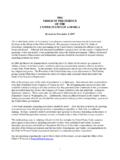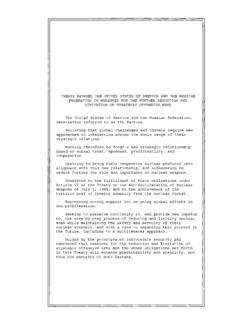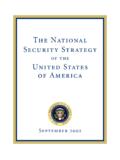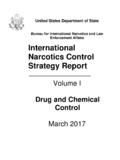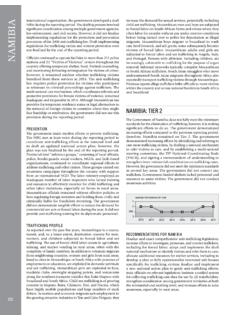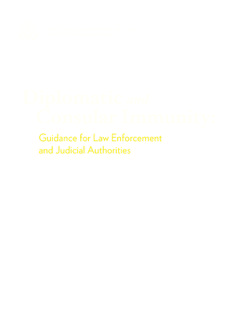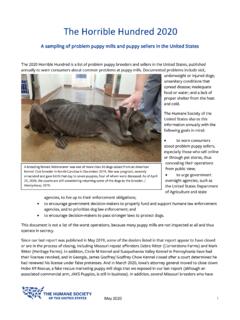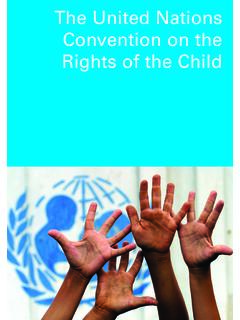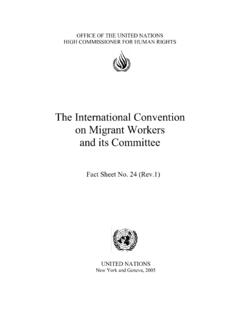Transcription of Revised National Statement of the United States of America ...
1 Revised National Statement of the United States of America on the Adoption of the Global Compact for Safe, Orderly and Regular Migration December 17, 2021 Introduction The Biden-Harris Administration is committed to safe, orderly, and humane migration around the world, including to the United States . In the very first days of the Administration, through a series of migration and protection-focused executive orders, President Biden established the framework for the United States to recommit to work collaboratively with governments, civil society, international organizations, and other partners to support humane migration, address the root causes of irregular migration, collaboratively manage migration in the region, rebuild the Refugee Admissions Program and other legal pathways for protection and migration.
2 Restore faith in the immigration system, include and integrate new citizens into civic life, protect child migrants, and support family unity. In his February 2021 Executive Order on creating a comprehensive regional framework on migration, the President reiterated our nation s history and values surrounding migration, reminding us that, For generations, immigrants have come to the United States with little more than the clothes on their backs, hope in their hearts, and a desire to claim their own piece of the American Dream. These mothers, fathers, sons, and daughters have made our Nation better and stronger.
3 The United States is also a country with borders and with laws that must be enforced. Securing our borders does not require us to ignore the humanity of those who seek to cross them. The opposite is true. Support for the Global Compact for Safe, Orderly and Regular Migration It is in this spirit that the United States is pleased to announce our endorsement of the vision contained in the Global Compact for Safe, Orderly and Regular Migration (GCM or Compact.) We commit to working with other countries to enhance cooperation to manage migration in ways that are grounded in human rights, transparency, nondiscrimination, responsibility-sharing, and State sovereignty.
4 The GCM reaffirms the sovereign right of States to determine their National migration policy and their prerogative to govern migration within their jurisdiction, in conformity with international law, while also critically recognizing that international migration is an inherently transnational phenomenon that no State can or should address alone. Nature of our Support The GCM is an aspirational document that expresses a common, voluntary political intention and intended course of action for States to pursue. It reflects a vision that the United States aspires to achieve to the extent consistent with our laws, regulations, policies, and particular obligations under international law - while also seeking, where appropriate, to improve our domestic laws and policies.
5 We recognize the list of actions under each commitment as examples that each State may draw upon in contributing to the implementation of the Compact, and we intend to do so, subject to the explanations provided below. The United States views these commitments in the context of our federalist system of government, where certain actions, such as those relating to education, the issuance of civil registry documents, certain social protection systems, and professional licensure, are addressed across multiple levels of government. We take this new approach to the GCM with the understanding, as set forth in paragraph 7, that the GCM is not legally binding, and as such, does not create or change rights or obligations under treaty or customary international law or our domestic laws, nor does the GCM necessarily reflect existing international law.
6 The United States welcomes the GCM s recognition, in Objective 21, of the need to facilitate safe and dignified return and reintegration, to include upholding the principle of non-refoulement in the context of migrant removals. In underscoring our support for this principle, we wish to clarify that obligations under international human rights law and refugee law with respect to non-refoulement are the provisions contained in Article 33 of the Convention Relating to the Status of Refugees (applicable to the United States by virtue of its ratification of the Protocol Relating to the Status of Refugees) and in Article 3 of the Convention Against Torture, as ratified and incorporated into law.
7 We support efforts to better protect the human rights of non-citizens in our country, regardless of immigration status, including in the context of immigration detention, as well as the appropriate use of alternatives to detention. With respect to Objective 13, we note that the Congress has enacted various statutes making immigration detention mandatory in certain circumstances. Non-citizen children in government custody are placed in the least restrictive setting that is appropriate for the child and are treated in a safe and dignified manner.
8 The United States also provides appropriate legal and procedural safeguards for all migrants and asylum seekers, and we interpret the GCM s references to due process and other protections, including for migrants seeking to cross an international border, those in government custody, and in the context of returns or removals, to be consistent with our international and domestic legal obligations. The United States strongly supports the recognition in Objective 3 (contained in paragraph 16 of the GCM) of the need to provide accurate and timely legal information to migrants.
9 Although the United States does not provide for counsel at the state s expense in most immigration proceedings, non-citizens can be represented at their own expense, in removal proceedings before an immigration court and in certain other immigration proceedings if they so choose. Moreover, the Department of Justice funds efforts to provide paid counsel for persons in proceedings who have vulnerabilities that make navigating the complex system alone even more challenging. The United States is committed to providing non-citizens with improved access to information about our immigration system and available options for protection and relief, including through the expansion of legal orientation programs, self-help workshops, and pro bono representation.
10 With respect to Objective 6 (paragraph 16), the United States supports strong protections for migrant workers against unethical recruitment, exploitation and abuse, as well as migrant workers equal enjoyment of labor rights, regardless of immigration status. In this context, we understand that the intention of equal pay for work of equal value is to promote pay equity, which we implement by observing the principle of equal pay for equal work. Consistent with our character as a welcoming nation of opportunity, and our values of compassion and human dignity, we believe it is essential to ensure that our laws and policies encourage full participation by migrants, including refugees, in our civic life; that immigration processes and other benefits are delivered effectively and efficiently; that no person is deemed illegal, or referred to in other derogatory terms.
